Family Travel
A true story about family travel, by Marybeth Bond about living in Mexico with her young daughters.
A mother worries about safety living in Mexico with her young daughters. I was misguided in my anxiety.
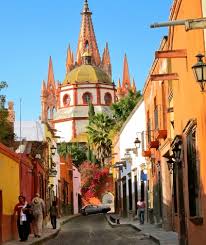
“Are you scared, Mommy?” whispered my seven-year-old daughter in the back seat of the battered Mexican taxi.
The driver accelerated, swerving into the left lane to pass a farm truck full of cows. The pale hazy sun slipped behind the mountains. Night was descending quickly as we roared through the desert toward San Miguel de Allende; it would be dark before we arrived.
More than the forced smile on my face, my queasy stomach spoke the truth. I was very nervous about our maniac driver, the lack of seatbelts, and how long it was taking us to get to San Miguel.
Annalyse, the seven-year-old, squeezed my hand, snuggling her head into my shoulder. She thinks I am invincible, I thought with a sense of irony. Her mom, the author of “Gutsy Women,” felt like an un-gutsy wimp. I could be so brave when I was alone, but add the responsibility of traveling with my daughters and I was having an attack of insecurity.
I avoided an honest answer and rationally, if not confidently, responded, “Sweetie, whenever I travel somewhere I’ve never been before, I’m both excited and uncomfortable.”
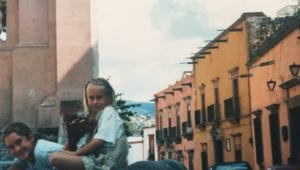
I explained, “I am just wondering what our host family will be like. During meals together will we be able to communicate? We don’t know very much Spanish do we? I bet they don’t know much English either. I hope our teachers at the Language Institute will be as nice as your first-grade teacher this past year.”
In the silence that filled the dark cab, I realized for the first time this trip wouldn’t be easy. I wished there was another grown-up along to help me keep an eye on my exuberant, wandering blond daughters.
Why was I so insecure about going to Mexico alone with my kids? Before marriage and motherhood I had traveled alone around the world for two years. I used to be a confident traveler. Motherhood seemed to have made me wary and cautious.
I could blame it on traveler’s fatigue. We were exhausted, having survived three flights to get to Mexico City. The flight was “direct,” but of course the airline never mentioned the two stopovers along the way!
News programs in the United States had warned us about the violent crime in and outside the Mexico City Airport. We held hands to stay together in the crowded terminals. Julieclaire and I wore our backpacks over our chests, instead of on our backs, to thwart pickpockets and thieves.
Outside the terminal there were no benches for weary travelers at the curbside bus stop, so we stood waiting for over an hour for the bus to Quaretaro. I was exhausted from watching our luggage, watching my children and keeping them entertained.
Aboard the Primera Plus deluxe bus, Julieclaire and Annalyse napped. I nervously thumbed guidebooks during the four-hour trip. At the bus stop, we hailed a cab for the one-hour journey to our final destination, a Mexican home in San Miguel de Allende.
The scrubby countryside of the highlands of central Mexico ended abruptly as we drove into town. We passed tacky-looking shops and bars with men spilling onto the unpaved streets. Where were the traffic lights, the neon signs and fast food establishments I saw in other Mexican towns?
Our cabbie stopped twice to ask for directions. Where were the narrow cobbled-stone streets and the charming colonial villas described in the guidebooks? When we careened around a corner into a dirt alley I was sure we were lost or being taken for a ride.
Our decrepit cab lurched to a stop as the grizzled driver pointed with pleasure at a messy hand-written sign on a white washed wall. It was the street address I had given him. I slumped back in stunned silence.
This neighborhood had no reassuring streetlights, no pedestrians, trees or even a stray barking dog. It was deserted and dirty. When he found the house address, my stomach churned. I didn’t want to get out of the taxi. The darkness, silence and poverty of the scene were intimidating.
The cabbie wanted no part of my hesitation or insecurities. He dumped our luggage on the street, grabbed his pesos and sped off.
We pounded on the wooden door and hoped for the best. Annalyse’s tiny warm hand found its way into my clammy cold fist. Julieclaire impatiently scuffed her foot in the dirt.
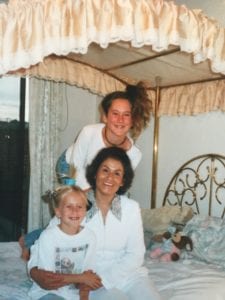
A short woman with charcoal-colored hair threw open the door, grabbed my free hand and pumped it in an energetic greeting. She was wearing a starched white apron over a somber black dress. Her unlined face made me guess she was in her thirties.
She introduced herself as Lourdes, and wasted no time welcoming Annalyse and Julieclaire with hugs. Julieclaire, at ten-years-old, was almost as tall as Lourdes. She took charge, leading us through an empty garage and into the main house, chattering non-stop in staccato Spanish. Her monologue, none of which we understood, cheered us up as we stacked our heavy luggage in a corner of our new home for the next fifteen days. Lourdes spoke to me in slow sentences. My knowledge of French helped me to piece together her Spanish words.
Lourdes knew intuitively what we needed. My children were hungry and I wanted to be taken care of. She led us into a large, empty dining room and seated us at the only piece of furniture, a lace-covered table.
She brought in bowls of corn flakes and cold milk. Ah, reassuring corn flakes! I remembered another time, when I had been on the road for over nine months, alone. I discovered corn flakes on a restaurant menu in Southern India. I relished every bite, transported back to Ohio and childhood breakfast before school.
Corn flakes had been my emotional link with home. And now, lifetimes later, my daughters also found a bowl of familiar cereal reassuring.
Removing her apron, Lourdes smoothed down her glossy hair, smiled and sat down at the table with us. Little Patrick, her cheerful five-year-old son, climbed onto her lap and furtively glanced at the girls. He made funny faces to get their attention. Julieclaire made goofy faces in return and our laughter echoed through the bare rooms.
After our snack, Annalyse and Julieclaire argued over who would get the bigger drawer in the dresser for their clothes; and over who had to sleep with mom on which bed in our tiny dark bedroom. Patrick peeked through the half-open door. He was fascinated by these two foreign girls who were squabbling as they pulled hair bows and games out of their bags.
Meanwhile, Lourdes gave me a tour of her three bedroom, cement block home, showing me what I would need to know—how to use the key to lock the front door, where to find purified water to refill our water bottles for drinking and brushing teeth.
We climbed up a narrow set of chipped cement stairs to the flat roof that served as the laundry. Lourdes showed me the clotheslines where we should hang our damp towels. A big, enamel wash tub, with a wooden washboard and bars of soap stood in the corner. This is where I would hand wash our clothes and hang them up to dry.
Wooden clothespins held sheets and underwear on the clotheslines. They flapped in the balmy summer breeze. A crescent moon was pasted against the black velvet sky. A myriad of stars competed with each other for space in the heavens. I was awed by this nocturnal beauty but pleasure lay shrouded beneath fatigue and sobering maternal responsibility.
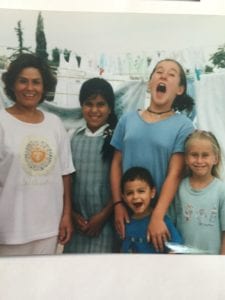
Lourdes held back the corner of a drying sheet and motioned for me to follow her through the laundry to the other side of the open roof. I was unprepared for the sight that awaited me. Dominating the city’s panorama was a pink Gothic cathedral with ornate steeples aglow with tiny lights.
We could hear the children below, giggling together in the bedroom. They were playing peekaboo. I let out a sigh of relief.
Lourdes spoke to me in slow sentences. My knowledge of French helped me to piece together her Spanish words. Lourdes was divorced, living alone with her children. She supported them taking in language students as boarders.
In addition to Patrick, she had a twenty-year-old son who worked the night shift in a dry cleaning factory and an eighteen-year-old daughter who was still in school and spent most of her time with her “novia,” or boyfriend. With a shrug and resigned laugh, she explained that her older children were rarely at home.
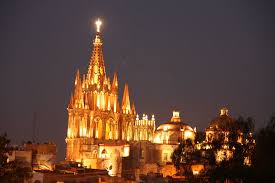
Lourdes attended elementary school for four years and could read and write “a little.” She considered herself fortunate, because after her divorce, she kept the house but little else. Now I understood why the rooms were sparsely furnished. Julieclaire noticed there were no pictures on the walls and not a book to be seen in the home.
When Lourdes finished speaking I wanted to tell her about my family, my life. Many times in my travels I have confided in other women, often relative strangers. I have told them secrets about my loves, my losses, my insecurities. Under the regal moon, Lourdes and I stood in silent female communion and I tried to explain my fear.
I pointed to the dark, empty streets below and asked her in my schoolbook Spanish: “I am with my daughters. My husband, their Papa, is not with us. No other adult is with us. Is it possible to walk in the streets at night? We want to go after dinner to the main square, to sit on the wrought-iron park benches near the bandstand to watch people or hear the mariachis play, to see the peddlers offering candy and the old men get their shoes shinned. But there are no lights here.”
I motioned to the dark and deserted street below and continued, “No one is in the streets. I am afraid. Is it a problem? Is my purse safe? Are my girls safe?”
Lourdes reached out and looped her arm through mine. She was small but solid and smelled as fresh as her hand-scrubbed clothing that hung around us. As we stood arm in arm, amid the fluttering laundry, I knew she understood my distress.
She pointed to a nearby rooftop. I saw two women rocking in chairs quietly conversing as they watched the streets below. They were partially hidden by their own drying laundry. I was surprised, for I hadn’t noticed any other life in the neighborhood.
She motioned to other roofs and open windows where women were together, witnesses to the dark and silent night. “No problem, Senora. Many women watch out for you. No problem to walk in the streets at night with no man,” she assured me.
I had traveled to San Miguel to experience the customs and the language, but the lasting legacy of our journey was this female kinship, this reaffirmation of the bond our gender feels, worldwide, as we confide in and support each other. 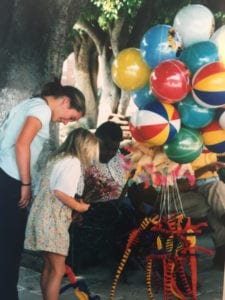
My daughters and I learned some Spanish, shared in another family’s life, walked confidently in the dark, laughed at ourselves, and ate too much ice cream.
Most importantly, we returned home, forever changed, surer of ourselves, strengthened, stretched, and having touched other women with our spirits.
Family travel doesn’t get any better than this!
This story appeared in my first book:
A Woman’s World.
For more family and adventure stories, click HERE